Biscoff Cheesecake
This delicious Biscoff Cheesecake recipe features a buttery Biscoff cookie crust, and a creamy Biscoff cheesecake filling. It’s topped with melted Biscoff cookie butter, and Biscoff cookie crumbs, which makes for a stunning and tasty dessert.
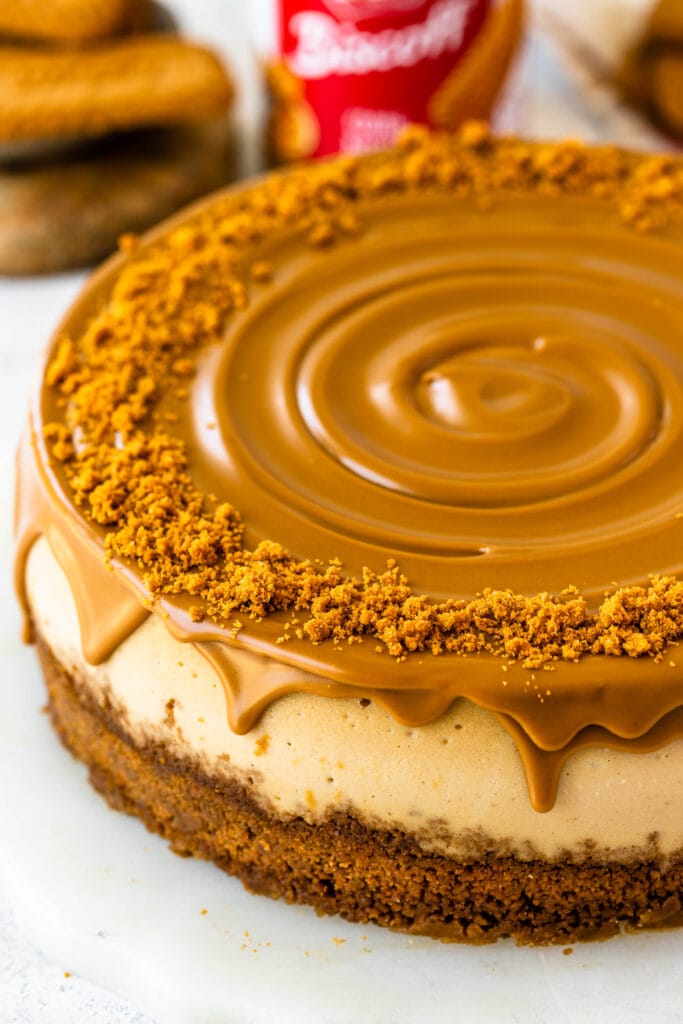
You will be surprised at how easily this recipe comes together. And with my tips below, you will be able to make a beautiful looking Lotus Biscoff cheesecake. Anyone who tries this recipe will absolutely love it!
For those who have never tasted the cookie, Biscoff is a type of spiced shortcrust biscuit made by the Lotus Bakeries, a dainty cookie that has won the hearts of many. Biscoff has received widespread popularity due to their unique taste and flavor.
This post may contain affiliate links. I earn a commission from qualified purchases. Please read our Privacy policy here.
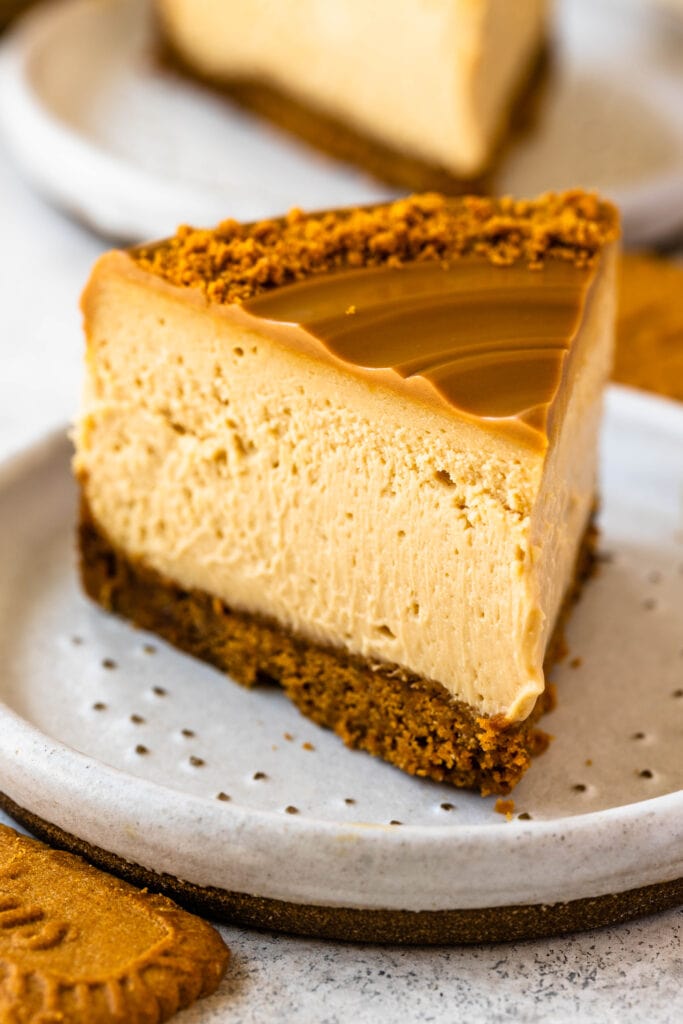
How to make Biscoff Cheesecake
The ingredients required to make this Biscoff cheesecake recipe are: lotus Biscoff biscuits, butter, cream cheese, brown sugar, granulated sugar, sour cream, Biscoff cookie butter, vanilla extract, salt, and eggs.
To make this Biscoff lotus cheesecake, you will need a food processor (or a rolling pin to crush the cookies), an electric mixer, a springform pan, and a large roasting pan.
Biscoff Cookie Crust Instructions
Let’s begin with the Biscoff cookie crust. Crush the Biscoff cookies into crumbs. To do this, you can use a food processor. Alternatively, you can place the cookies in a ziplog bag and use a rolling pin to crush the cookies.
Mix with melted butter, and press the crumbs onto the bottom of your springform pan.
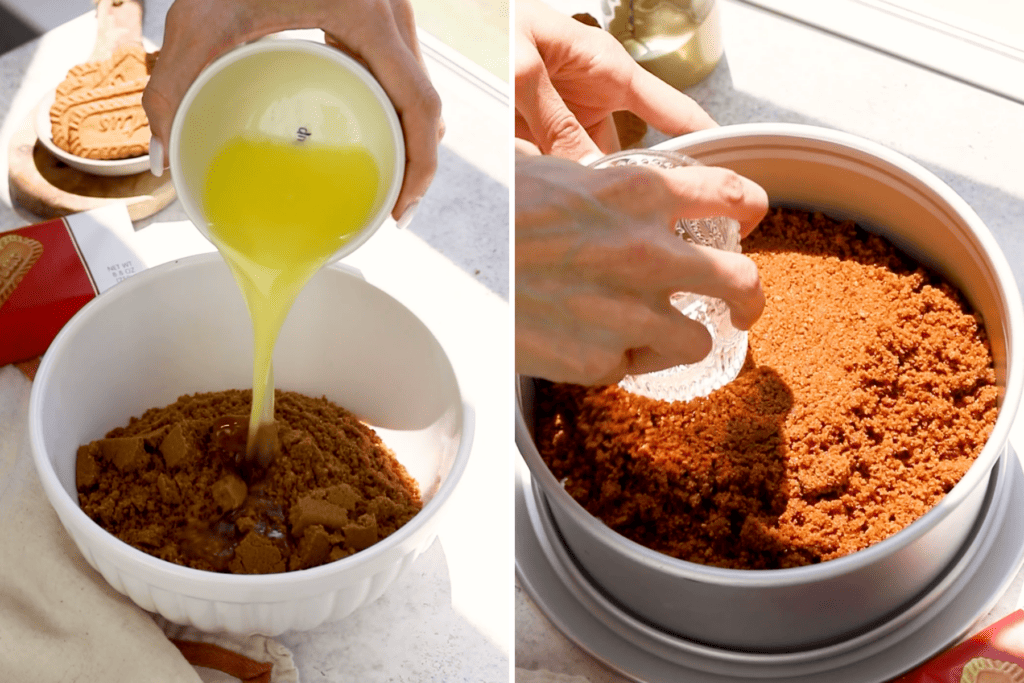
Bake in the oven for about 10 minutes – your crust should come out slightly golden. While the crust is baking and cooling, it’s time to prepare the cheesecake filling.
Biscoff Cookie Butter Cheesecake Instructions
To make the Biscoff Cheesecake batter, start by beating the full-fat cream cheese with an electric mixer. If using a stand mixer, use the paddle attachment. I just used a hand mixer.
Add the brown sugar and granulated sugar to the bowl and beat.
Then, add the lotus Biscoff cookie butter spread along with the sour cream and mix to combine.

Finally, add the eggs, vanilla extract, and salt.
I added the eggs all at once, but often times when making cheesecake, it’s recommended that you add the eggs one at a time, waiting for one egg to be incorporated before adding the next one. That is because you want to avoid over mixing the batter once the eggs have been added. Beating the eggs too much can cause the cheesecake to crack.
Since I was using my hand mixer, and it’s not very powerful, I know the batter wouldn’t be over mixed if I added all the eggs at once. However if I was using my kitchenaid stand mixer, I would add the eggs one at a time.
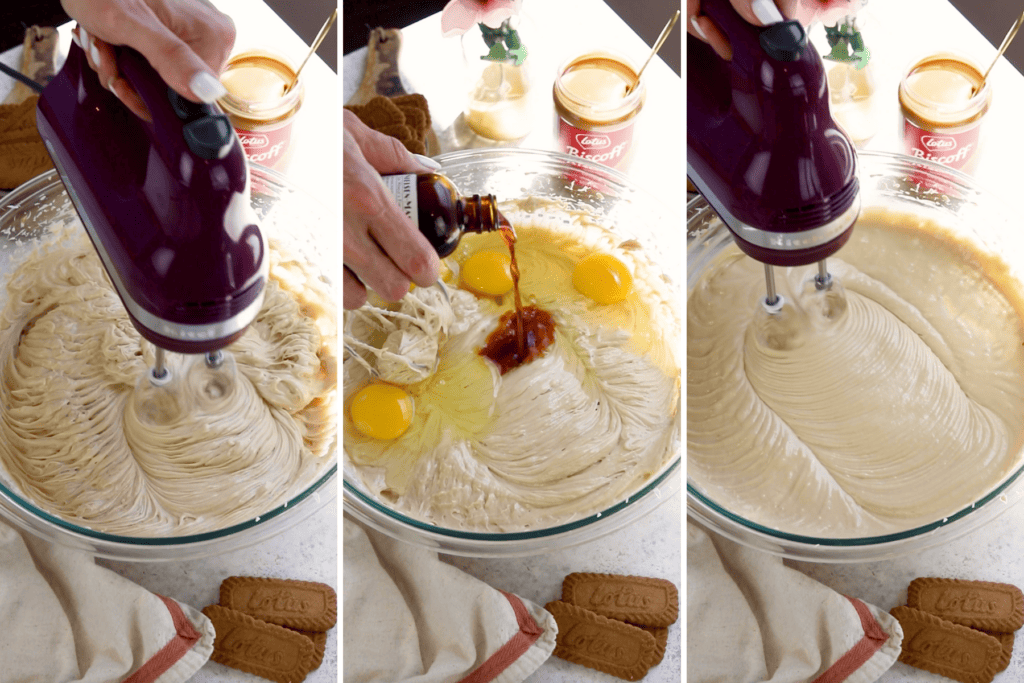
Spread the cheesecake mixture on top of the baked cookie crust. I used a deep 8-inch springform pan to make the cheesecake, you can also use a 9-inch springform pan.
Wrap the bottom of the springform pan with a few layers of aluminum. Then, place it in a large roasting pan.
Pour hot water in the roasting pan. And place the cheesecake in the oven.
Bake cheesecake for 60 to 70 minutes in the 325ºF oven.
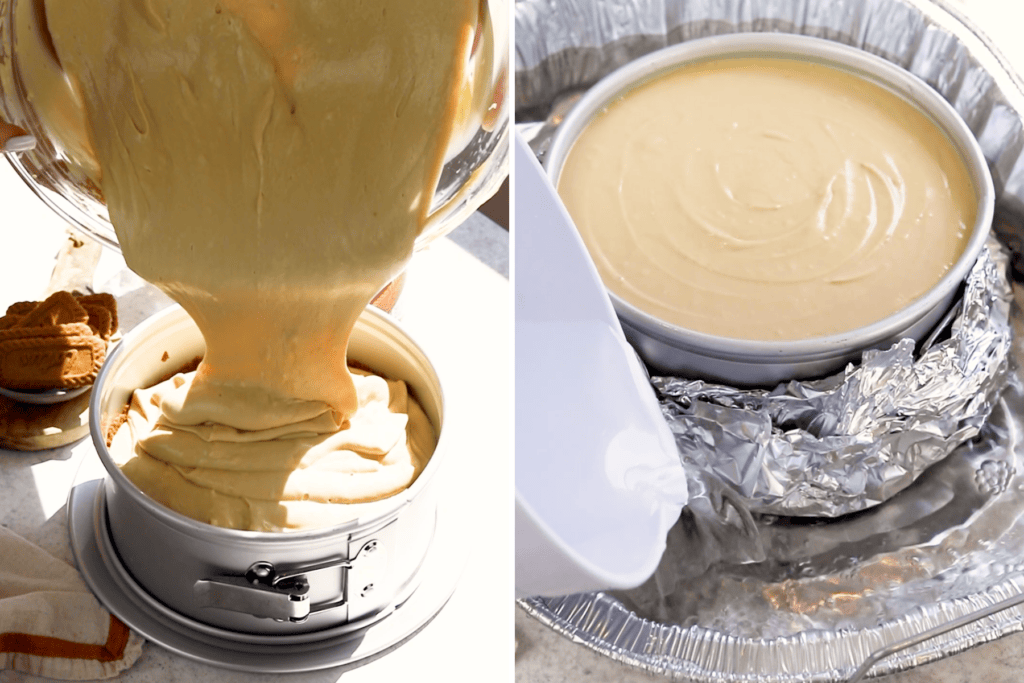
How to check if the cheesecake is done baking
To check if the cheesecake is done baking, wiggle the pan gently. The center should be slightly jiggly, while the edges of the cheesecake should look set.
Once the cheesecake is done baking, turn the oven off, and leave the cheesecake in there for one hour. If you remove the cheesecake from the oven immediately after baking, the sudden temperature change can cause the cheesecake to collapse and break.
After you remove it from the oven, remove the foil from the bottom, then place in the fridge to chill for at least 6 hours before serving.
Before removing the sides of the springform pan, run a knife around the edges between the cake and the pan, to ensure there won’t be any bits stuck when you try to lift the side.
To decorate, melt some biscoff lotus cookie butter in the microwave and drizzle on top of the chilled cheesecake.
Use an offset spatula to spread it around.
Sprinkle some biscoff crumbs around the edges.

Tips when making Biscoff Cheesecake
- Ensure that all ingredients are at room temperature before you begin making the cheesecake, which will allow for all ingredients to incorporate nicely together.
- Be careful while mixing the ingredients; you don’t want to over mix them, as it can make the cheesecake break.
- Use a springform pan so that your Biscoff cheesecake can be easily removed when sliced for serving.
- Grease the sides of the springform pan to ensure the cheesecake won’t stick. Not all pans need to be greased, but my aluminum one does need to be greased, so this is just something to keep in mind.
- Don’t open the oven while the cheesecake is baking
- Let the cheesecake sit in the oven with the closed door for 1 hour after it’s done baking. The sudden temperature change can make the cheesecake break and collapse.
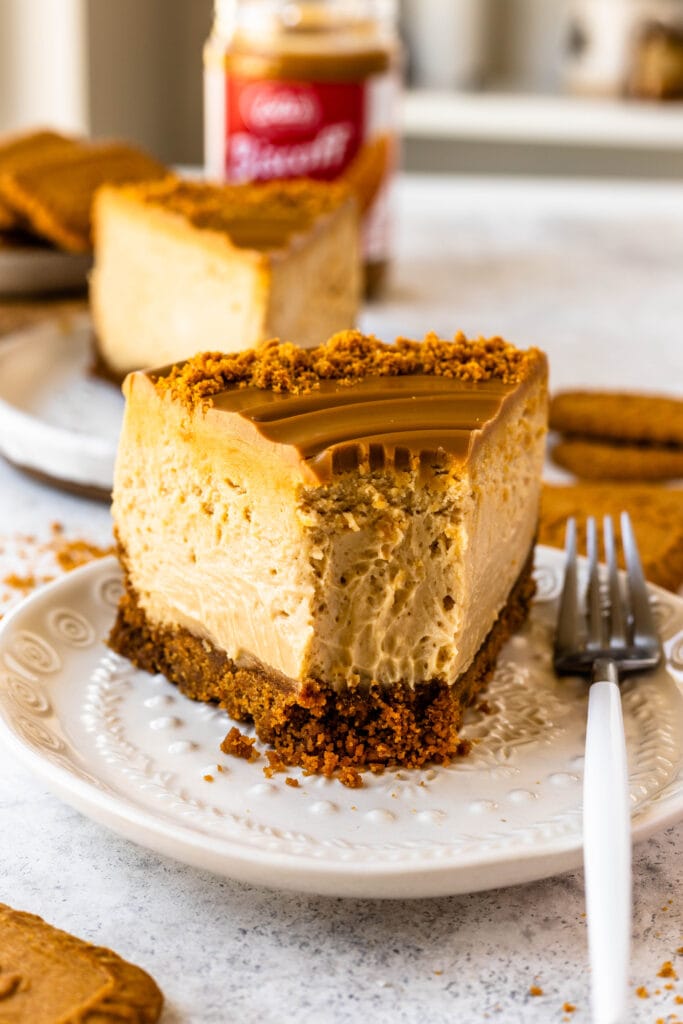
To store the Biscoff Cheesecake
You can store the Biscoff cheesecake in the fridge for up to 4 or 5 days, covered in an air tight container.
The cheesecake can also be stored in the freezer for up to 2 months. Make sure to place it in an air tight container. You can also freeze the cheesecake first, then once it’s frozen, wrap it with plastic wrap very tightly and then place in an air tight container. This will extend its freezer shelf life.
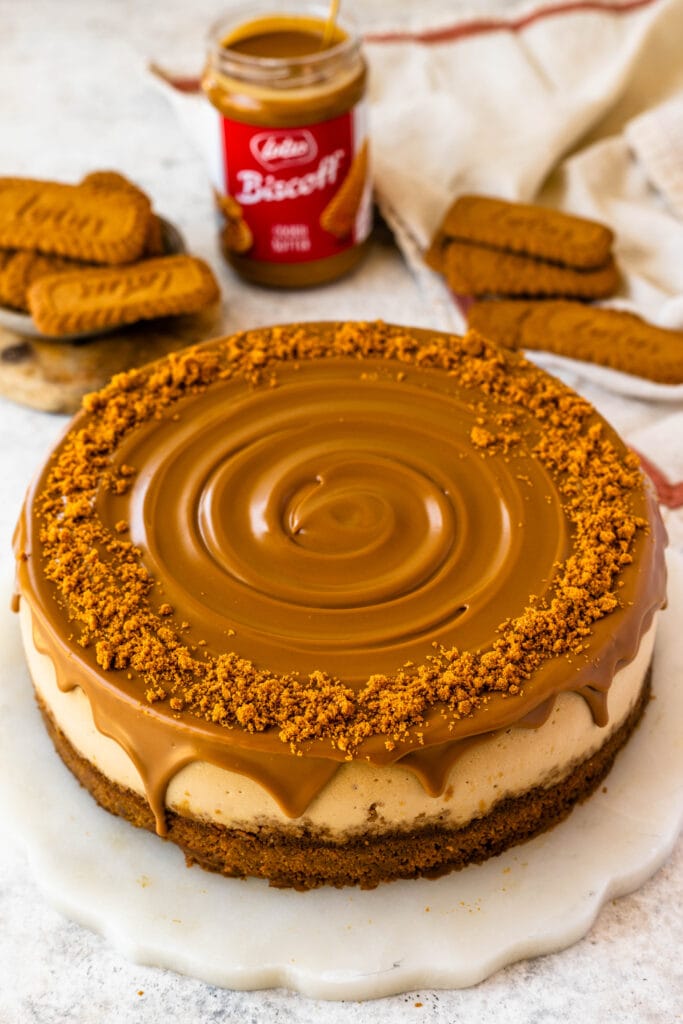
This cheesecake has an absolutely creamy texture, and an indulgent taste. Biscoff tastes a bit like spiced shortbread, with caramel and cinnamon notes, and those flavors shine through the tangy cream cheese, and the buttery crust.
You can also get creative and decorate the top of the cheesecake with some whipped cream and those filled round Biscoff cookies.
That’s another decoration I had in mind for this cheesecake, but once I poured the melted Biscoff butter on top, and the drizzle was so perfect with the swirls and the sprinkled cookie crumbs, I decided to leave it at that.
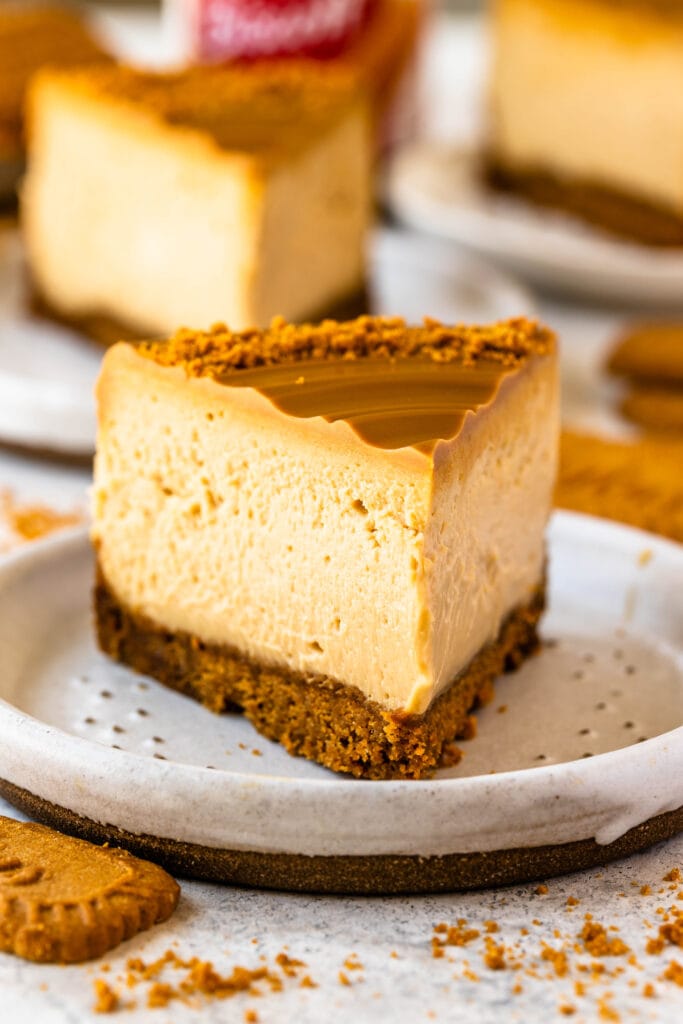
If you like this Biscoff Cheesecake, here are some other desserts you might like:
- Baklava Cheesecake
- Lemon Cheesecake
- Apple Dulce de Leche
- Cannoli Cheesecake
- Funfetti Cheesecake
- Pecan Pie Cheesecake
- Biscoff Cake
- Biscoff Truffles
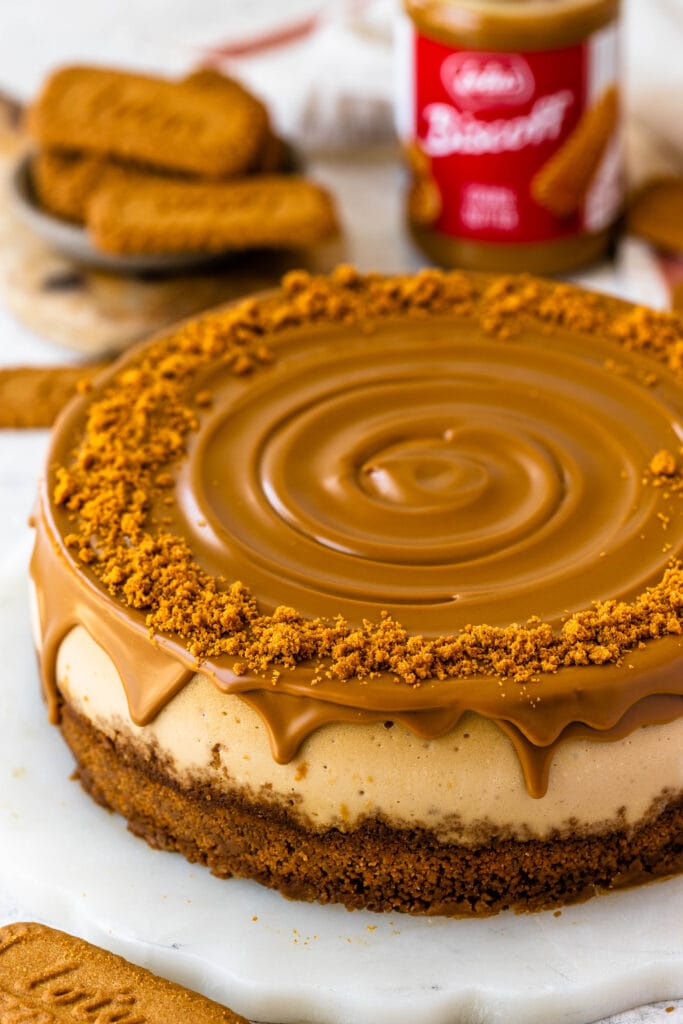
Biscoff cheesecake can be your perfect go-to-dessert for events, parties, or any gatherings. With its crunchy and creamy flavors, it’s sure to amaze those who get a chance to taste it.
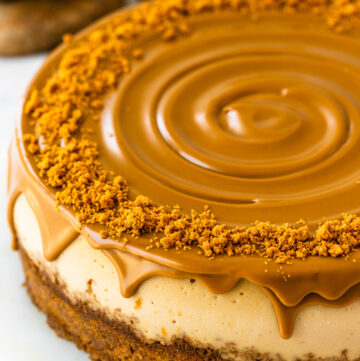
Biscoff Cheesecake
Ingredients
Biscoff Crust
- 250 grams biscoff cookies 1 package of biscoff cookies
- 1/3 cup unsalted butter 75 grams
Biscoff Cheesecake Batter
- 907 grams cream cheese softened (4 packages of 8 oz.)
- 1 cup brown sugar 200 grams
- 1/4 cup granulated sugar 50 grams
- 1/2 cup sour cream 120 grams
- 1 cup biscoff cookie butter 240 grams
- 1 tbsp vanilla extract
- 1/4 tsp salt
- 4 large eggs room temp
To decorate
- 1/2 cup biscoff spread
- 1/4 cup biscoff cookies crumbled
Instructions
Biscoff Crust
- Pre-heat the oven to 325ºF.
- Place the biscoff cookies in a food processor and process to obtain fine crumbs.
- Melt the butter and mix with the biscoff crumbs.
- Press the mixture on the bottom of an 8” or 9” cheesecake pan. If using an 8” pan, it must be deep.
- Bake the crust in the oven for 10 minutes.
- Remove it from the oven and let it cool down.
Biscoff Cheesecake Batter
- Beat the cream cheese for 3 minutes with a mixer at medium speed, until creamy.
- Add the brown sugar and granulated sugar to the cream cheese and beat for another 2 minutes at medium speed.
- Scrape the bowl and beat for another 30 seconds.
- Add the sour cream and biscoff cookie butter to the bowl, and mix to combine. Scrape the bowl.
- Add the vanilla, salt, and mix.
- Make sure to scrape the bowl a few times during the mixing process, to avoid the cream cheese from forming lumps in the batter.
- Add the eggs to the batter, mix just until combined. It’s best to add one egg at a time, waiting for one egg to be incorporated before adding the next one.
- Avoid over mixing once the eggs are added, to prevent cracking of the cheesecake.
- Pour the cheesecake in the pan, over the baked and cooled crust. Some cheesecake pans, such as my own, require the sides to be greased before adding the batter in, or the cheesecake sticks, so I always spray the sides of my pan with oil before pouring the cheesecake batter in.
- Wrap the bottom of the pan with a few layers of foil.
- Place the pan in a larger roasting pan, and add hot water to the roasting pan, to form a water bath. This is very important so the cheesecake doesn’t crack.
- Bake the cheesecake in the pre-heated 325ºF oven for 60 to 70 minutes.
- To check if the cheesecake is done baking, give the pan a little wiggle, it should jiggle slightly in the center, but the edges should look set.
- Turn the oven off, and leave the cheesecake in there for 1 hour.
- Remove the cheesecake from the oven and place it in the fridge for at least 6 hours.
To decorate
- Melt the biscoff cookie butter in the microwave for a few seconds until it’s runny.
- Pour over the cheesecake and spread with a spatula.
- Spread biscoff cookie crumbs around the edges of the cheesecake.


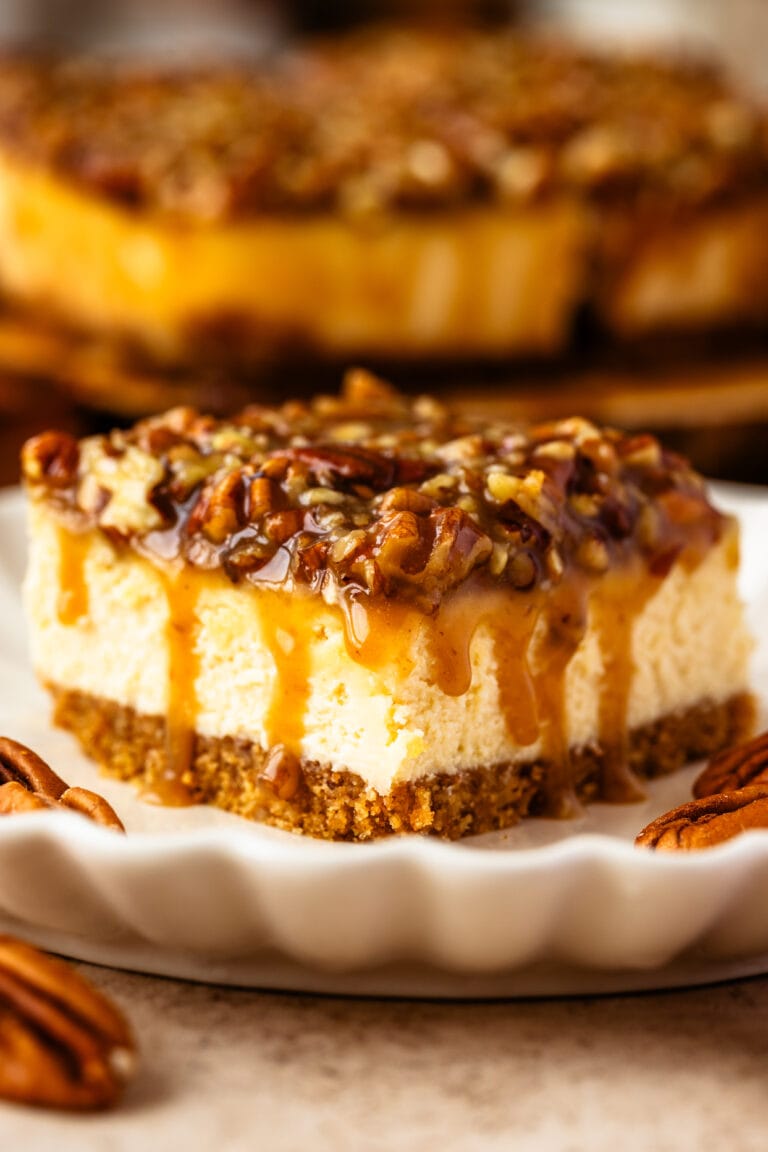
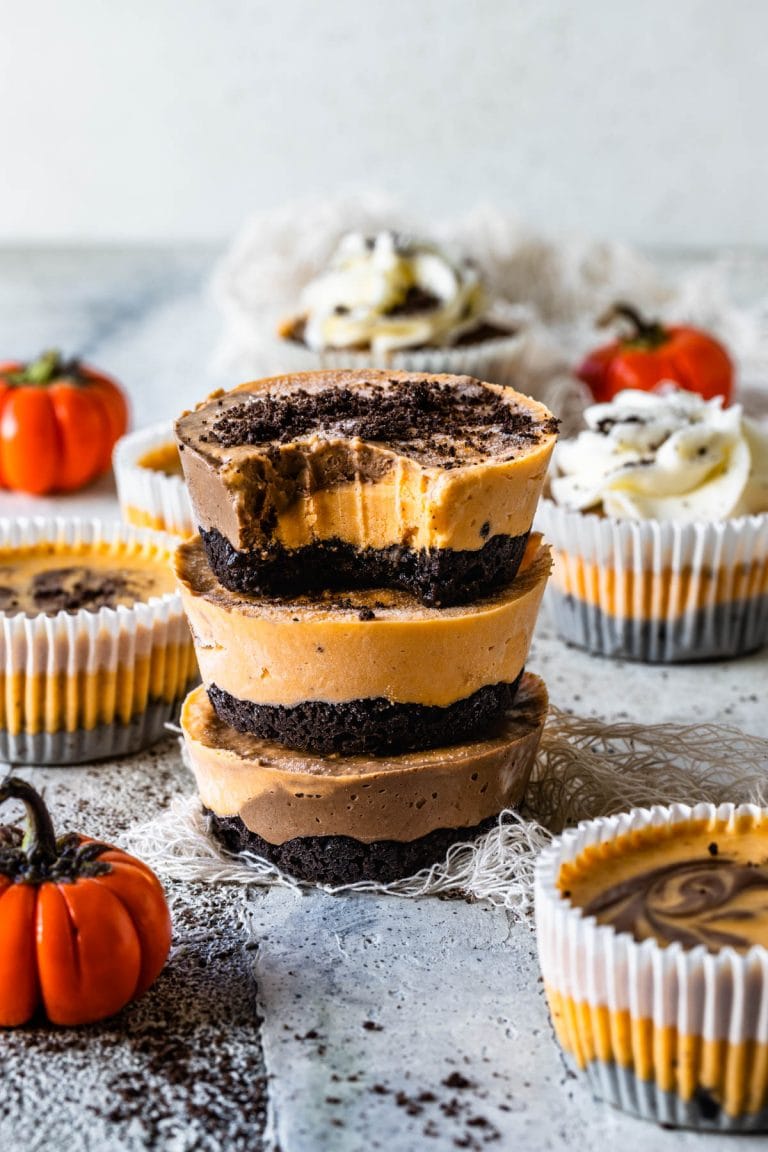
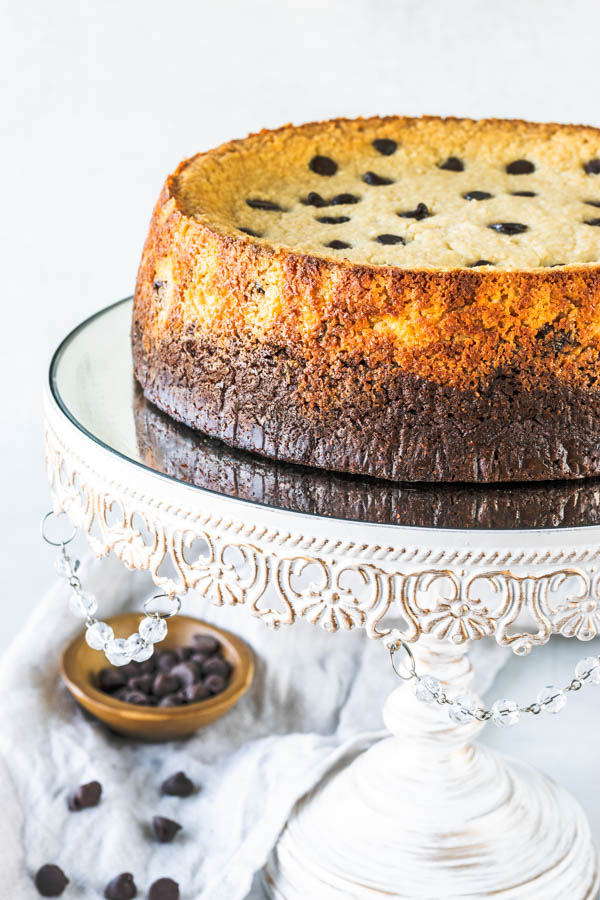
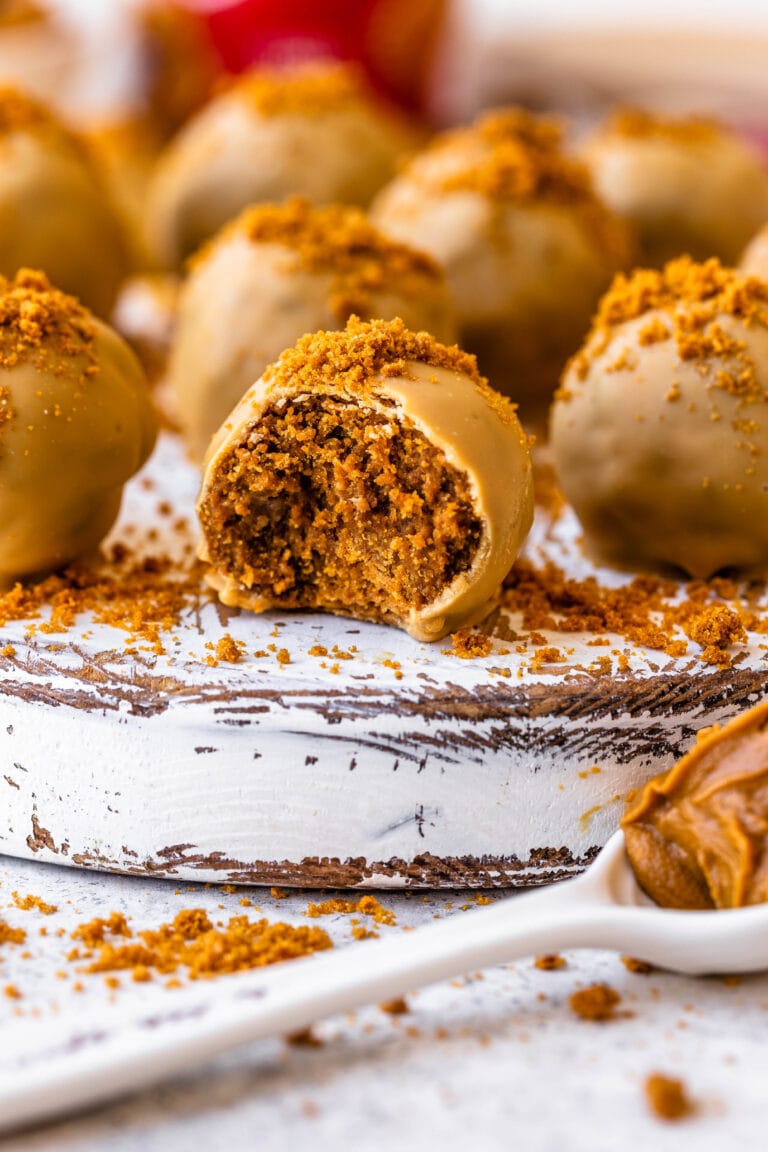
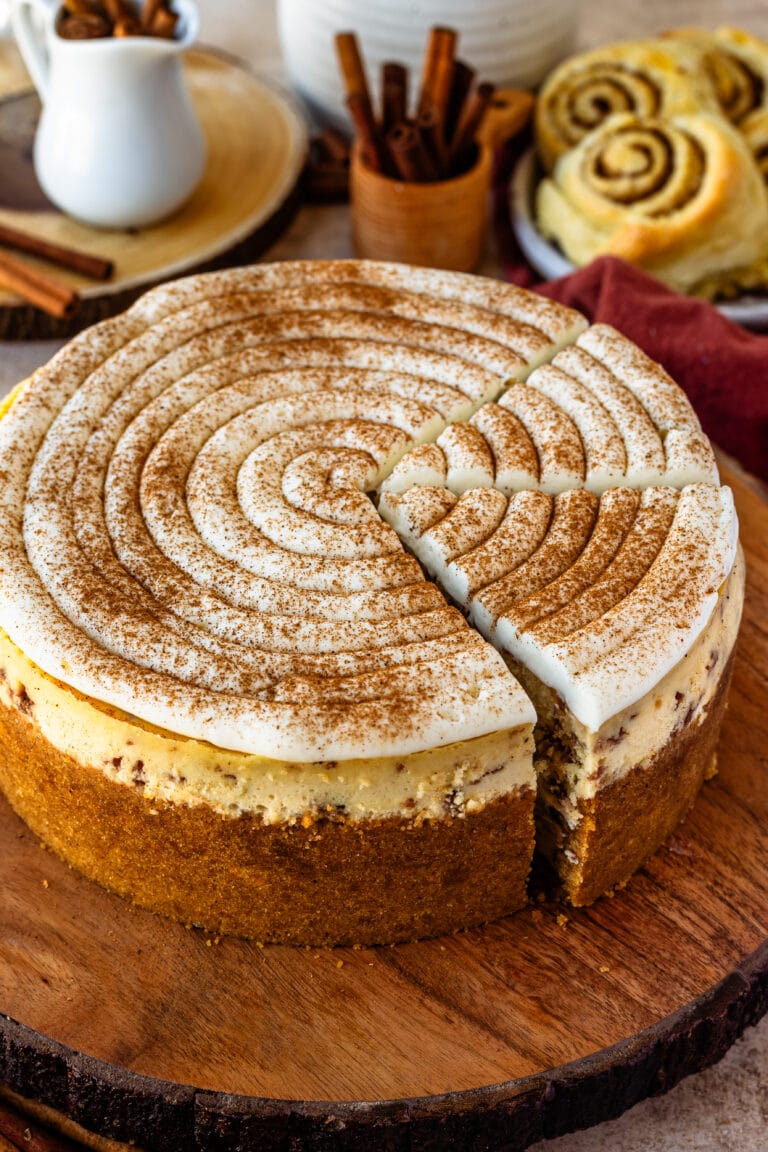
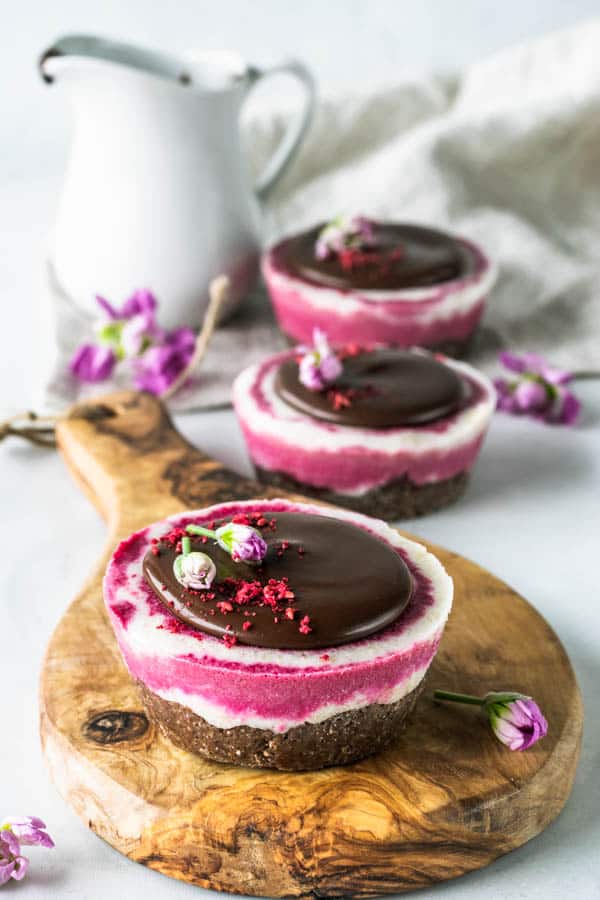
Que delícia!! Maravilhoso!! 😋😋😋😋😋😋
Made this cheesecake today.It was so wonderful.Making it every holiday!
Hello do you know of any alternatives to using eggs in this recipe? It looks delicious and I want to make it for an upcoming birthday but can’t use eggs.
Sorry, I think it’s best to find a vegan or egg free biscoff cheesecake recipe. Perhaps a no bake one, because it definitely won’t have eggs then. I would love to work on a no bake biscoff cheesecake recipe but I don’t think I’ll be able to for a few weeks.
Thank you so much for the help! I appreciate the feedback!
There is a no bake recipe, quick an delicious no eggs. Made it twice, it’s now a family fav
Hi you can use cornstarch instead of eggs to bind it together or you can do a no bake cheesecake with eggs.
no, you should look for a no-bake biscoff cheesecake recipe instead. there are several of them online.
There is a no bake version on YouTube
Hi! Can I replace sour cream with Greek yogurt?
yes you can.
Made this for a family dinner and everyone loved it! We had no leftovers, so creamy! And I had never made a cheesecake before, didn’t crack, which I was worried about. I did get a bit of water on my pan, but I think I didn’t wrap it tight enough with the foil But didn’t even alter the crust, I thought it was going to make it soggy, but didn’t! This recipe is 100000000000 so good!
This is so……good, Everyone gave a thumbs-up. The salt raised a notch higher in taste. Love it.
This is really tasty and easy too! I was worried that the texture would be too firm after staying in the oven for that our afterwards. The only complaint is that the cheesecake seemed very hot to go in the fridge even after that hour – I wonder if some ovens need to be cracked open? As a result, my cheesecake had a big crack in the middle once it cooled off, but that didn’t affect the flavor – its yummy. Thank you!
I let mine cool completely on the counter on a wire rack before putting it in the fridge. It came out perfect.
how do u make the biscoff cookie butter?? says 1 cup in cheesecake, does not say how much in total for cheescake and decorating
Ive never made it before, I just buy it ready at the store. So 1 cup for the batter, and for the decoration part says on the bottom it’s 1/2 cup.
Is it possible to halve the recipe?
I only have 2 cream cheese packages?
Thanks in advance.
yes certainly
This may sound like a silly question but when do you remove the springform ring? Right before you pour the spread on top and after it’s completely cooled?
I take it off right before I put the spread on top, once it’s been in the fridge. But if the cheesecake has completely cooled, I dont see why you couldnt remove the ring then. I just do it like this out of habit.
What happens if you use salted butter?
totally fine
I could only find the crunchy biscoff spread at the store. Do you think that will mess up the texture of the cheesecake??
I dont think it will mess it up, but it will have a crunchy texture.
Any tips for making this cheesecake into bars? I’m wanting to bring this to a potluck, but am unsure of baking time and if anything else would need to change. Thank you!
use a 9×13 pan, use the same cheesecake recipe, but you will need more crust. Make the crust from this recipe https://www.piesandtacos.com/pumpkin-cheesecake-bars/, which is also biscoff. And use the baking time and instructions from the Pumpkin Cheesecake bars, but the ingredients for the filling, use all from this recipe here. Got it? let me know if you have any more questions.
The best cheesecake EVER!! I got so many compliments when I made this for my husbands birthday. Super great recipe & instructions!! Thank you!
Made this for Christmas Eve and it was a hit. The whole family LOVED it. I made it in a square springform pan and it looked great. Thank you for sharing your recipe. I will definitely make this again! 😁
I made this cheesecake for my dad’s birthday and it was a hit. Thank you for sharing this recipe
That’s lovely to hear! Thank you!!
I am not a very much cheesecake fan so I rarely bake them. I tried this recipe and it came out so well and everyone enjoyed it.I am going to try your other cheese cake recipes too. Thanks you so much for sharing this recipe 😍
I have a question, if I want to transfer the cheesecake onto a board how do I do it ? Crust was too stuck to pan bottom and I never used baking paper. Thanks
I am so glad you liked the recipe. About the cheesecake being stuck, I have two questions: what kind of pan do you have, and did you grease the pan before putting the crust in? When I grease the pan before adding the crust, it becomes too greasy and the crust ends up becoming soggy and sticking, which sounds counterintuitive. But now I only grease the pan on the sides, where the cheesecake batter is going to touch, and I do that after baking the crust.
I dont use baking paper to bake cheesecake. But maybe the type of pan you have could benefit from it, if it’s prone to sticking.
And the way I transfer the cheesecake to another plate is that I use a cake lifter from Wilton to lift the cheesecake and transfer it over. It slides right under the cheesecake and you can easily pick it up and transfer it.
Thanks for your quick response Camila. I greased the pan bottom before baking the crust. I felt the crust was quite dry after baking.
I greased the edges after baking the crust and before pouring the batter for baking.
It’s a spring form non stick pan I used for baking. I had to take the cake to a small gathering so I just took the cake along with the bottom of the tin.
As these kind of tins have slightly raised edge around it is not possible to lift the cake using a cake lifter.
Just seen another video, someone did upside down method to transfer the cake to a board. May be I should give it a go next time or change the pan. 😊
Just realised I have been following you on Instagram for sometimes and didn’t know until today this recipe is from you. Because I found this recipe on Pinterest. By the way I love your bakes😍
That’s interesting, I haven’t seen that method, maybe putting a piece of parchment paper on the bottom before flipping could work indeed. What brand of pan is it? A lot of people ask me questions about cheesecake lately since I am posting so many recipes, so if I can see what the pan is maybe I can help more people figure out how to remove the cheesecake easily from the bottom easily.
I made this for Christmas and it turned out perfectly! It was so delicious and everyone raved about it.
What would be the bake time for the crust and filling for mini cheesecakes? And would you recommend baking in a muffin tin or silicon mold?
Thanks!
the crust for mini ones takes about 8 min to bake, and the filling takes about 20 to 25 min to bake. I have baked in muffin tins and silicone molds and both are fine! Ive actually just made some yesterday (different flavor) in muffin tins and it took me 27 min to bake but it’s because I overfilled the pans ops lol! but give or take 20 to 25 min.
I really like this cheesecake. I was not able to do the water bath so the cheesecake cracked but it was still delicious. I also used heavy whipping cream instead of sour cream.
Sempre fazendo delícias!! Que receita maravilhosa!!😍👏🏻👏🏻👏🏻😋😋😋